What’s a “Functional Beverage?”
Have you ever wondered what makes functional beverages "functional?” You'd think the fact that a beverage is 1) liquid, and 2) potable would be enough for it to functionally be considered a beverage.
Prepare to be amazed.
Functional beverages are a species unto themselves. The name is a food-industry term that refers to non-alcoholic drinks that contain one or more ingredients to help the drinker's body do something — for example, hydrate more efficiently, boost energy or support gut health. These attributes help the drinker achieve their specific goals. For example, recovering from exercise, feeling more awake, or bolstering their physical or emotional health in some way.
The rise of functional beverages coincides with the transition away from function-less beverages (which is a term we just made up). Drinks that were wet and tasty were also cheap and popular well into the 1980s — think sugary drinks like soda, or crystalised fruit punch and ice teas of the "just add water" variety. These kinds of products are certainly beverages, but they don't offer anything beyond their liquidity — and the "tasty" bit often meant high sugar and artificial flavors. In fact, many of these beverages proved over time to be significantly unhealthy if consumed in volumes (think high-sugar, high-caffeine soda pop). As shoppers became more health-conscious, they wanted better options. “Functional” thus has become a sort of synonym for “healthy.” Or at least a drink that is targeted to some specific health-related value proposition.
Enter the functional beverage.
Functional beverages are part of the largest category of Non-GMO Project Verified products, and the demand for more and better choices is only growing. Today we'll look at the most popular attributes.
We're number one! Hydration and energy
Drinks that offer extra hydration or put a spring in your step have always been popular, and sports and energy drinks are the most popular of the functional beverages.
Coffee is probably the original functional beverage. We've been drinking it for centuries (though our ancestors might not recognize a Frappuccino as a descendent of the coffee family). While modern energy drinks still rely heavily on caffeine, brands and consumers continue to search for alternatives to the boost-and-crash cycle caffeine often brings with it. The latest energy drinks are made with L-theanine, creatine, guarana and ginseng, and brands are constantly tinkering with combinations and proportions to deliver the biggest boost to their customers.
Hydration is another high-appeal attribute, even if it seems weird at first glance. After all, don't most beverages offer hydration? Being liquids, isn't that pretty much their thing? It's true that many bevvies will wet your whistle, but they aren't all equally good at it. For example, experts realized long ago that consuming electrolytes could help elite athletes recover from competition (enter Gatorade, perhaps the original “energy drink” created to boost athletic performance), or keep people battling illness from becoming dehydrated by their symptoms (enter Pedialyte).
Hydration is central to adequate body functioning and most of us don't drink enough water as it is. Once brands put those ideas side by side, hydration vaulted from a reliable niche attribute (for olympians and folks with stomach bugs) and joined the mainstream (for everybody who doesn't drink enough water). The beverage cooler has never been the same.
Runners up: Digestive health and immune support
Our growing awareness of personal health runs parallel to our interest in digestive health and immune support. People living with chronic conditions — and people hoping to avoid developing them — are all looking for proactive ways to improve their health. That search often leads to the gut.
Research shows that a healthy digestive system is crucial to overall well-being. The gut is the poster-organ for holistic healthcare, the central depot for our bodily system's interconnectivity. It is no wonder that digestive health and immune support rank side by side in popularity — they are inextricably linked.
Immune boosters that focus elsewhere than the microbiome, such as products enhanced with vitamins and antioxidants, are also growing in popularity and that trend has only steepened since the start of the coronavirus pandemic. Unsurprisingly, people have reacted to the uncertainty of pandemic life by asserting all the control of which we are each capable, including making sure our immune systems are as robust as possible if and when we are exposed to the virus.
 The next big thing: Brain, mood and relaxation
The next big thing: Brain, mood and relaxation
Emotional and mental health are critical to our overall well-being — again, part of an existing trend that got a rocket-boost due to covid. We knew it was already trending before 2020, but it's gotten its close-up ever since! Between resurging interest and a suite of new ingredients, beverages to support relaxation, cognition and mood are predicted to be the next big thing.
One collection of ingredients is called "nootropics," and it includes compounds that assist executive functions like memory, clarity, creativity and motivation. Whereas a jolt of caffeine might get the task done, nootropics will supposedly help you do it better and more sustainably.
And then there is CBD — the cannabinoid derivative that launched a thousand over-the-counter applications. The benefits of CBD are still being explored. So far, it appears in gummies, oils, tinctures, drinks, a range of topicals and even pet products. CBD is still illegal in some regions of the U.S., and the FDA has yet to make a final ruling that might clarify its status. At this time, the Non-GMO Project does not verify CBD products.
We are well past the era when what wasn't in our glasses (no sugar! fewer calories!) directed spending. Today, consumers want to know what's in there and, more importantly, what has it done for them lately. As the functional beverage sector expands, we can expect new ingredients as well as more sophisticated combinations of existing attributes.
And, of course, there is the taste! Functional beverages might have a job to do, but no one wants to pinch their noses and force liquid down, even if the benefits are compelling. Many of us only become dedicated drinkers if we like the taste. And this is where Non-GMO Project Verification becomes important. There is a growing sea of products that get their flavor from synthetic biology. In a word, they get their scents and flavors from genetically engineered microorganisms. Synthetic biology, or synbio, is an emerging field of genetic engineering, and the Non-GMO Project Standard prohibits its use in Verified products.
Whatever function or health benefit you hope to get from your chalice, mug, or sippy cup, consider yourself lucky that there are so many all-natural, organic and non-GMO options. Which goes to show you: Not all innovation is unnatural, synthetic, or created in a lab. Nature herself offers a rich bounty of “functional” ingredients, which innovative better-for-you beverage companies are identifying and sourcing at a smart clip.

